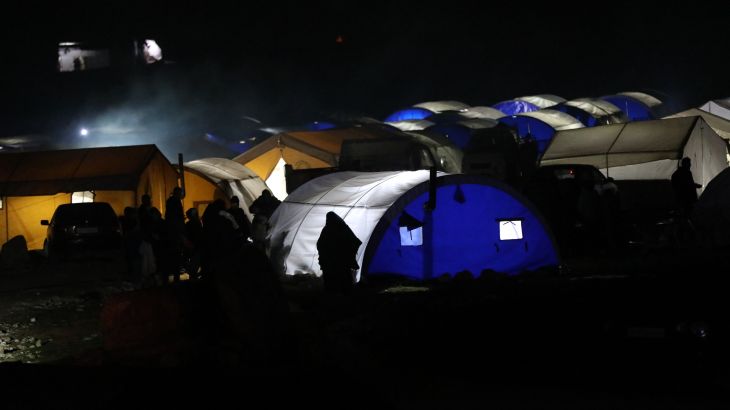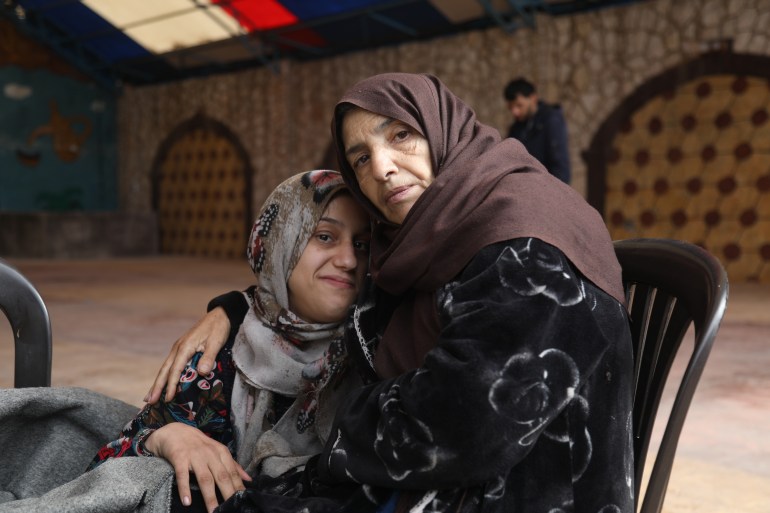Panic injures many as traumatised Syria hit by new earthquakes
People in northwest Syria are ‘traumatised’ and still reeling from the February 6 quakes that killed more than 4,000 in Syria.

Fear and panic caused the most injuries in northwest Syria when two new earthquakes hit on Monday evening, just two weeks after the catastrophic 7.8 magnitude earthquake that devastated large parts of the region including southern Turkey.
At least six people have been killed and hundreds wounded across both countries.
Keep reading
list of 3 itemsFive killed in Israeli air strikes on Syria’s capital, Damascus
‘Buried alive’: Syrians recount losing family in the earthquakes
“Many were hurt because of stampedes, panicking and even jumping off buildings,” Oubadah Alwan, a spokesperson for the Syria Civil Defence, also known as the White Helmets, told Al Jazeera.
The rescue group estimated more than 190 injuries in the opposition-held part of the country that is home to four million.
“Civilians are mostly sleeping out and refusing to go back into their homes despite the cold,” Alwan said. “People are traumatised.”
In a shelter on the outskirts of Idlib, 40-year-old Ismail Abu Raas told Al Jazeera he ran out of his building with his wife and five children as soon as he felt the tremor on Monday.
The streets were filled with people who had also evacuated their houses and shelters. His family remained outside for four to five hours before making their way to a shelter, too afraid to go home.
“We go from plight to plight, from the government strikes to this,” Abu Raas said.
Khadija Ali Omar, 70, recounted feeling the “horror” as bits of the ceiling crumbled as she fled her house with her daughter, who has a disability.
“How we made it out, I don’t know,” she said.

Wassel Aljerk, programme manager for the Syrian Expatriate Medical Association, said many buildings collapsed in Atareb, Salqin and Jandaris.
“We are hearing of lots of injuries as people are jumping out of apartments, worried they will not be able to escape in time,” Aljerk said in a statement.
The Syrian American Medical Society, which runs hospitals in northern Syria, said it treated several people who suffered heart attacks brought on by fear.
More than 4,000 people died in Syria following the February 6 quakes while more than 41,000 deaths were reported in Turkey.
Delivering aid to northwest Syria
Millions of people in the opposition-controlled areas received no assistance in the days following the earlier earthquakes, which damaged critical roads and infrastructure needed to organise deliveries of aid through the only UN Security Council-approved border crossing, Bab al-Hawa.
On February 13, Syrian President Bashar al-Assad issued a three-month authorisation for UN aid deliveries to pass through two more border crossings.
The head of the White Helmets, Raed al-Saleh, denounced the UN decision to seek authorisation from al-Assad for the delivery, saying it allowed him to score a “political gain”.
The group’s spokesperson, Alwan, told Al Jazeera that while it was “very ironic” that the UN would strike a deal with a government it condemned for using nerve gas against its own people, the organisation was glad to see more border crossings open to aid.
“This is something we’ve been demanding for so long,” Alwan said, adding that a three-month authorisation was insufficient and that the UN must now focus on securing a long-term solution.
Parties to the conflict have also obstructed the passage of aid into the region from cross-line routes.
The Syrian government, Hay’et Tahrir al-Sham (HTS), a former al-Qaeda affiliate that controls a portion of northwest Syria, and the Turkey-backed Syrian National Army (SNA), which controls some territory across northern Syria, have all hampered humanitarian assistance from reaching heavily affected areas.
Corinne Fleischer, Middle East regional director at the World Food Programme (WFP), said the organisation has greater quantities of ready-to-eat food in Syria than in Turkey, but has been so far largely been unable to deliver it to the affected areas.